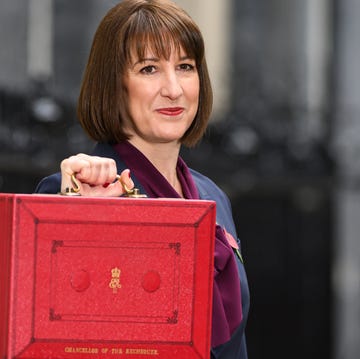Fraud has soared in recent years and is now the most commonly experienced crime in the UK, with 2023 seeing 3m incidents, according to UK Finance’s Annual Fraud Report. The Classic FM presenter Moira Stuart nearly became one of that number when she was targeted by a sophisticated banking scam. The fraudsters were only stopped when a vigilant bank counter staff member at her bank. She said in an interview that she thought she was immune to being ripped off because she was 'very aware of scams'.
While it accounts for 40% of all reported crime in England and Wales (though the actual figure is thought to be much higher) and fraudsters are employing increasingly sophisticated tricks to part us from our money, people who’ve been defrauded often talk about their guilt and shame about having ‘allowed’ themselves to be taken in.
Action Fraud, the UK’s national reporting centre for fraud and cybercrime, describes fraud as ‘trickery used to gain a dishonest advantage, which is often financial, over another person’. Unlike crimes such as burglary or theft, fraudsters often emotionally manipulate their victims before stealing money or personal data, sometimes over a period of months or even years. This can make people feel violated, let down and, most perniciously of all, that they’re in some way responsible. ‘Falling victim to fraud isn’t just about losing money,’ says Matt Hepburn, fraud spokesman for TSB. ‘It can take a heavy mental toll on individuals, who understandably can feel shame, guilt and a betrayal of trust.’
What to read next
While the language of fraud – scam, con, swindle – can make it seem like an old-fashioned crime, now that we can be online 24/7, it’s relatively simple for fraudsters to bombard us with fake texts, calls and emails. Four-fifths of all reported fraud is online or ‘cyber-enabled’. Providing personal and financial data online has become commonplace and, while it can make our lives more efficient, the downside is that criminals know and exploit this.
Authorised Push Payment (APP) fraud, where someone is tricked into sending money to a fraudster posing as a genuine payee, is one of the most common scams. This can include receiving fake messages asking you to pay postage charges on a delivery, fraudsters impersonating a staff member from your bank to get you to transfer funds, and romance scams, which involve building up a relationship over time before asking for money.
Recent scams in the headlines include fraudsters pretending to have genuine tickets to sold-out events, such as Taylor Swift’s Eras tour, and putting fake QR codes over legitimate ones, for example on pub menus, to divert payments. The run-up to Christmas always sees a rise in fraud, too, as scammers exploit the festive season by targeting busy shoppers, whether it’s by selling fictitious goods online, impersonating delivery companies or offering loans for festive shopping.
‘Fraudsters are increasingly sophisticated in their approach and can be highly convincing when impersonating your bank, HMRC, police and even family members,’ says TSB’s Matt. ‘Always verify that any contact made out of the blue is genuine by contacting the organisation in question directly, and don’t transfer money or give away any personal or sensitive information.’
It wouldn't happen to me...
The sheer number and variety of frauds committed means that even the most scam-savvy people can fall victim, making the self-recrimination and shame even worse. Although the older generation might be seen as more vulnerable to scams, a poll carried out for online bank Marcus by Goldman Sachs in 2022 found that those aged 34 and under were in fact twice as likely to fall victim to financial scams than older age groups.
A belief that ‘it wouldn’t happen to someone like me’ can actually increase our risk; while 55% in this younger age group believed they were too technologically savvy to be scammed, they were also the age group most likely to give away personal information under pressure.
‘Fraudsters send out huge numbers of random messages in the hope that some land,’ says Rebecca Cummings from Avyse Partners, which specialises in financial crime prevention, ‘but they can also target particular groups. Older people are often contacted by cold callers pretending to be from energy companies threatening to cut them off, which can be very frightening. With younger people, it’s easy for fraudsters to connect as they interact through so many channels these days. Even the most savvy can fall foul of fraudsters and then have all the embarrassment that goes with it.'
Reluctant to report
Not only do these feelings of shame magnify the impact of the crime itself, they also mean people are often reluctant to report it, feeling that they’ve been stupid or complicit. The Crime Survey of England and Wales estimates only 13% of cases are reported. ‘Victims can feel intense shame from being cheated and don’t want to tell anyone,’ says Margaret Snowdon OBE, chair of the Pension Scams Industry Group. ‘Society and authorities tend to blame victims for their own “foolishness”, so there’s little sympathy and support.’
Some types of fraud can make the target feel shame and embarrassment far beyond the financial loss itself. Romance fraud is particularly hurtful. ‘Not only are people being defrauded out of their money but they’re also grieving for the end of a relationship that they believed themselves to be in,’ says Rebecca Cummings. Victims are often too ashamed about what’s happened to them to tell anyone – even their own families – making the burden even heavier.
The plight of pension fraud victims
Fraud isn’t just limited to scam links and dodgy websites; pension fraud, when people are persuaded to take money out of their pensions to invest in fake or risky investments, is a significant part of the overall fraud problem but is often under-reported. The Pension Scams Industry Group (PSIG) estimates that around £6bn is lost to pension fraud every year and victims often report that financial institutions, and even the police, are unsympathetic to their plight.
When the rules around pensions were simplified back in 2006, the idea was to give people more power over their money. Unfortunately, due to what some say was a weakness in how pensions were regulated, many bogus schemes were set up and then sold to victims via FCA-accredited advisers, some of whom were knowingly taking part in the scams. Language such as ‘savings advance’, ‘pension review’ or ‘pension liberation’ was used to cover up fake schemes, but the results were the same – many lost all or some of their pensions (the average individual loss is £75,000), which they’d worked for all their lives and at a time in their lives when the losses could never be recovered.
Margaret Snowdon says: ‘Victims of pension fraud often don’t realise that they’ve been defrauded until well after the event. It can be years before they try to access their savings and then get a nasty shock when they discover that their money has gone, by which time the trail has gone cold.’ To make things worse, victims then often receive hefty tax demands on their scammed pension funds, with HMRC chasing some for up to 55% of the amount lost in tax when they were misled into accessing their pensions early by fraudsters. This, found by an inquiry into pension fraud by Parliament’s Investment Fraud group, was even more devastating than the original scam and has led to people being driven to consider suicide. ‘Victims in this situation have lost their entire savings to a scammer, but in the eyes of the law, the victim is responsible and must still pay tax,’ says Margaret.
While pension rules have since been tightened, early victims of pension fraud have been engaged in legal battles for up to 14 years to stop HMRC demanding tax on the money that was defrauded from them. Sue Flood, who lost her pension to a scammer and is facing a huge tax bill from HMRC (see right), has set up Fraud Victims United along with lawyer Carly Barnes to support those impacted by historic fraud. ‘We’re not only victims of the fraudulent schemes, but we’ve also been attacked by HMRC and labelled as tax avoiders,’ she says. ‘People have committed suicide, marriages have broken down, families have been damaged and people’s health has suffered.’ Sue is hopeful that the new Government will change the law to protect fraud victims from unfair tax charges and to put the penalty on to the perpetrators instead.
Moving on from fraud
So, if you’ve been a victim of fraud, how do you let go of the feelings of shame and guilt that often go with it? Psychotherapist Gin Lalli says that fraud not only involves financial and emotional distress, but can also erode trust and lead to significant changes in behaviour and lifestyle, such as social withdrawal, paranoia and isolation.
‘My advice would be to understand that shame, guilt and embarrassment are all normal,’ she says. ‘Learning more about how fraud happens and how to protect yourself in the future can restore a sense of control, while talking to friends, family or a mental health professional can reduce feelings of isolation and provide emotional relief.
Joining support groups and connecting with others who’ve faced similar experiences can help and provide comfort. You won’t feel so alone.
What's being done to clamp down on fraud?
The Online Fraud Charter launched last year, with the aim of reducing online fraud as technology companies clamp down on scam content on their platforms. Online giants such as Google, Meta (owners of Facebook and Instagram), Microsoft, YouTube, TikTok and X have signed up and committed to increase their efforts to detect and block fraudulent material, work more closely with law enforcement agencies and share knowledge across the industry to help protect consumers from fraud.
The creation of a National Fraud Squad was announced the previous year, with 400 new specialist investigators working with local police forces, international partners and the UK intelligence community to shut down organised fraud groups.
New fraud refund rules, which come into force from October, should also help, as banks will now be required to automatically reimburse victims of APP fraud.
‘Banks are getting better by introducing measures such as two-factor authentication, warning messages such as “Are you sure you want to send this?” and checking you have the right bank account before you press send.
It’s all about adding friction to the process, so that people take a step back and think about what they’re doing,’ says Rebecca.
How to protect yourself against the latest scams
If you’re paying for a meal or parking by scanning a QR code, make sure it takes you to the correct website – fake QR codes can lead you to scam sites.
* Watch out for individuals or companies warning you might have been scammed and offering to help as they’re likely to be scammers, too.
* Fraudsters ramp up attacks over the festive season, so try not to be pressured into making a purchase.
* Whether it’s an email asking you to ‘verify’ your bank account details, or a text claiming you’ve missed a delivery and need to pay a redelivery fee, the goal is the same: to trick you into revealing personal and financial information.
* If someone calls saying they’re from your bank, hang up and call your bank’s number. A genuine employee will understand.
* If you think you’ve been scammed, report it immediately to your bank and Action Fraud at actionfraud.police.uk or call 0300 123 2040. In Scotland, call 101. For free, confidential support, contact Victim Support















